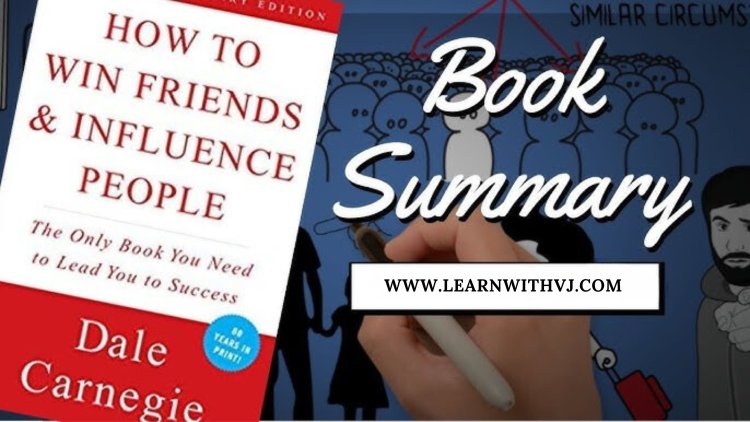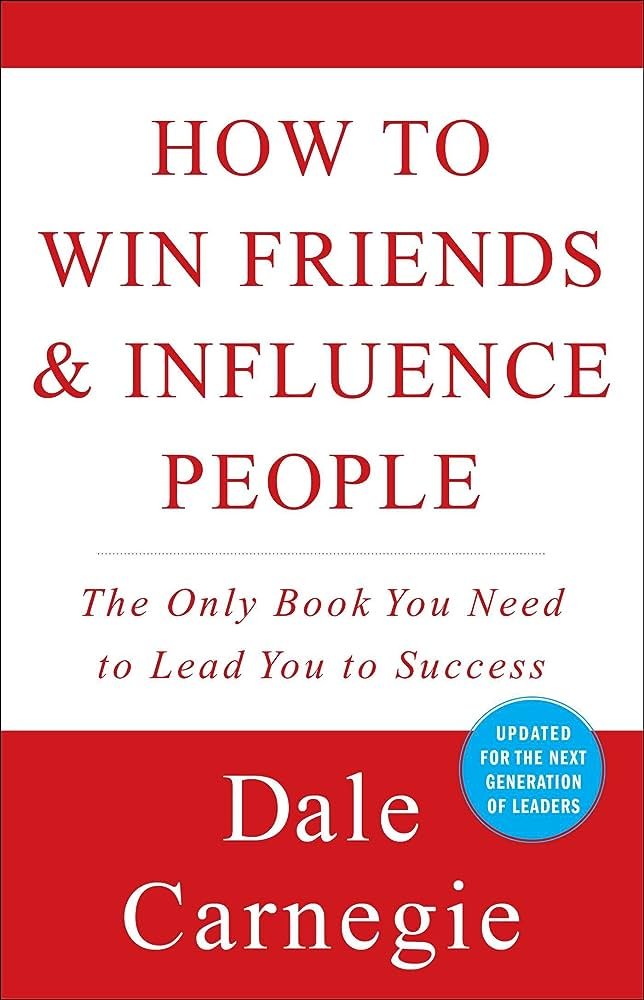How to Win Friends and Influence People: A Timeless Guide to Human Connection (Review)
Published in 1936, Dale Carnegie's "How to Win Friends and Influence People" has become a self-help phenomenon, selling over 30 million copies worldwide and remaining a staple on bestseller lists for decades. But is its message, centered on building strong interpersonal relationships, still relevant in today's fast-paced and often digital world? This review dives deep into the book's core principles, analyzes its strengths and weaknesses, and ultimately explores its enduring value in the 21st century.

First Impressions: A Foundation of Friendliness
Carnegie wastes no time in establishing his central thesis: the key to success and happiness lies in our ability to connect with others authentically. He emphasizes that genuine interest in others, sincere appreciation, and a focus on making others feel valued are far more effective than mere flattery or manipulation.
The book is divided into four parts, each tackling a crucial aspect of interpersonal communication:
-
Part One: Fundamental Techniques in Handling People: This section lays the groundwork with principles like not criticizing, complaining, or arguing; giving honest and enthusiastic appreciation; and arousing in others a genuine desire. Carnegie emphasizes the importance of a positive attitude and the power of a smile, a concept that may seem obvious but easily forgotten in daily interactions.
-
Part Two: How to Make People Like You: Here, Carnegie delves deeper into specific techniques for fostering connection. He advocates for becoming genuinely interested in others, remembering names, and making others feel important. He also emphasizes the power of active listening and encouraging others to talk about themselves.
-
Part Three: How to Win People to Your Way of Thinking: This section shifts the focus towards persuasion and influence. Carnegie highlights the importance of understanding the other person's perspective, appealing to their nobler motives, and dramatizing your ideas to make them more engaging. He advises against arguments and criticism, advocating instead for a collaborative approach that seeks common ground.
-
Part Four: Be a Leader: How to Change People Without Giving Offense or Arousing Resentment: The final section tackles the delicate art of leadership and influencing change. Carnegie emphasizes the importance of leading by example, inspiring a vision, and praising progress. He encourages leaders to avoid blame and criticism, focusing instead on motivating and encouraging others.

Strengths: Timeless Wisdom and Practical Application
Carnegie's book undoubtedly shines in its practical approach. He doesn't simply preach platitudes; he offers concrete, actionable steps that readers can implement in their daily lives. Each principle is accompanied by real-life anecdotes and examples, making the concepts relatable and engaging.
The book's focus on empathy and genuine interest in others is another key strength. In a world obsessed with self-promotion and instant gratification, Carnegie's message of prioritizing connection and building meaningful relationships feels refreshingly countercultural. His emphasis on active listening and understanding different perspectives fosters not just personal gain but also a more compassionate and understanding society.
Weaknesses: A Touch of Datedness and Potential for Misinterpretation
While the core principles of "How to Win Friends and Influence People" remain timeless, some aspects of the book reflect the social and cultural norms of its time. The language can occasionally feel outdated, and some examples may not resonate with modern readers. Additionally, Carnegie's focus on techniques and strategies can, if misinterpreted, come across as manipulative or inauthentic. It's crucial to remember that the book's true message lies in fostering genuine connection and respect, not simply employing tricks to win people over.
Relevance in the Digital Age: Connecting Beyond the Screen
In an era dominated by social media and digital communication, the need for strong interpersonal skills remains as vital as ever. While face-to-face interactions may have decreased, the core principles of effective communication – active listening, empathy, and genuine interest – still hold true. Carnegie's book serves as a valuable reminder that even in the digital age, our success and happiness hinge on our ability to build meaningful connections with others.
However, navigating relationships in the digital world presents unique challenges. The curated online persona often masks our true selves, making it harder to build authentic connections. Carnegie's advice on active listening and understanding different perspectives becomes even more relevant in this context. We must learn to read between the lines of digital communication, be mindful of the limitations of online interactions, and actively seek opportunities for deeper, face-to-face connection.
Beyond Self-Improvement: Building a Better Society
The impact of Carnegie's book extends beyond individual self-improvement. By encouraging genuine interest in others, active listening, and respectful communication, the book sets forth a vision for a more compassionate and connected society. In a world often divided by egotism and conflict, Carnegie's message of understanding and collaboration holds potent potential for fostering greater empathy, mutual respect, and positive change.
However, it's important to acknowledge that Carnegie's principles should not be viewed in isolation. Building a better society requires more than just individual charm and persuasion. It necessitates addressing systemic issues of inequality, injustice, and power imbalances. While interpersonal skills are crucial for navigating social life and achieving individual success, true societal change demands collective action, advocacy for marginalized voices, and working towards a more equitable and just world.
A Legacy of Inspiration and Growth
"How to Win Friends and Influence People" has undoubtedly earned its place among the most influential self-help books of all time. While its message may not resonate with everyone, its core principles of empathy, authenticity, and constructive communication offer a valuable foundation for building stronger relationships and navigating the complexities of human interaction. In an age of increasing polarization and digital disconnect, Carnegie's timeless wisdom serves as a reminder that the key to happiness and success lies not in manipulation or self-promotion, but in fostering genuine connection with others and striving for a more compassionate and understanding world.
Diving Deeper into the Conversation: Exploring the Thought-Provoking Questions
The review I provided for "How to Win Friends and Influence People" offered several questions to spark further engagement. Let's explore each one in detail, delving into the nuances and potential avenues for thought and discussion:
1. Which of Carnegie's principles resonate most with you? Why?
This question invites personal reflection on which of Carnegie's ideas you find most relevant and impactful in your own life. Perhaps the emphasis on genuine interest resonates because you value authentic connection, or maybe the advice on avoiding criticism speaks to your desire for fostering positive relationships. By examining your personal response, you can gain insights into your own values and communication style.
- Consider: Which principles have you already put into practice? Have they yielded positive results? Are there any principles you find challenging or difficult to implement? Why?
- Discussion prompt: Share your most resonant principles with others and explore the reasons behind them. Do you find common ground or differing perspectives? Can you learn from each other's experiences?
2. How can we adapt these principles to navigating relationships in the digital age?
This question challenges us to apply Carnegie's timeless wisdom to the unique landscape of digital communication. While face-to-face interactions remain fundamental, online spaces present new opportunities and challenges for connection.
- Explore: How can we cultivate genuine interest and active listening through digital communication? What strategies can we implement to avoid misunderstandings and build trust online? How can we navigate the curated personas and filtered realities often present in social media interactions?
- Discussion prompt: Share your strategies for building meaningful connections online. Discuss the unique challenges and opportunities presented by different platforms (e.g., email, social media, online forums). Can we bridge the gap between our online and offline selves to foster authentic relationships?
3. What are the limitations of Carnegie's approach, and how can we address them?
A critical analysis of Carnegie's work is crucial to ensure its responsible application. While his principles offer valuable tools, it's important to acknowledge potential limitations and ensure they are applied ethically and inclusively.
- Consider: Does Carnegie's focus on individual charm and influence risk overlooking systemic issues of power dynamics and privilege? How can we ensure that his principles are used to empower others, not simply manipulate them? Can his approach be adapted to promote social justice and address inequalities?
- Discussion prompt: Discuss the potential ethical pitfalls of using Carnegie's techniques. How can we avoid manipulation and ensure our communication remains authentic and respectful? How can we use his principles to advocate for marginalized voices and promote broader societal change?
4. How can we build upon Carnegie's message to create a more just and equitable society?
Ultimately, Carnegie's insights should encourage us to strive for a larger vision of a better world. His focus on communication and connection can be a powerful tool for building bridges and fostering understanding across diverse groups.
- Explore: How can Carnegie's principles be used to promote empathy and intercultural understanding? How can we leverage effective communication to address prejudice and discrimination? Can his message inspire collective action towards building a more just and equitable society?
- Discussion prompt: Imagine a world where Carnegie's principles are widely embraced. How would communication, relationships, and society as a whole be different? What concrete steps can we take to move towards this vision?
These questions are just a starting point for an enriching and challenging conversation. By delving deeper into them, we can unlock the full potential of "How to Win Friends and Influence People" and harness its power to build stronger relationships, create a more connected world, and contribute to a more just and equitable future.
Remember, the value of engaging with these questions lies not in finding definitive answers but in the process of open dialogue, critical reflection, and shared learning. As we explore these ideas together, we can discover new perspectives, expand our understanding of human connection, and ultimately, work towards building a better world for ourselves and others.
Conclusion: An Enduring Guide to Building Meaningful Relationships
Despite its minor shortcomings, "How to Win Friends and Influence People" remains a valuable resource for anyone seeking to improve their interpersonal skills and build stronger relationships. Its timeless principles of empathy, appreciation, and genuine interest transcend cultural and generational boundaries. While the book may not offer a magic formula for instant popularity, it provides readers with a solid foundation for creating authentic connections and fostering meaningful relationships.
This book, regardless of its age, has sparked countless conversations and ignited personal growth journeys. By engaging in critical reflection and open dialogue, we can ensure that its legacy continues to inspire and empower individuals to build better relationships, live more fulfilling lives, and contribute to a more connected and compassionate world.
Disclaimer:
This review presents an analysis of "How to Win Friends and Influence People" based on its published content and its historical context. It is crucial to acknowledge that some aspects of the book may reflect the social and cultural norms of its time, which in certain instances might not align with modern sensibilities.
The review aims to spark critical reflection on the book's principles and encourage an open dialogue about their applicability and potential limitations in today's world. It is not intended to provide definitive answers or promote uncritical acceptance of all of the book's ideas. Readers are encouraged to engage with the material thoughtfully and form their own informed opinions.
Additional Links:
- Official DaleCarnegie.com website: https://www.dalecarnegie.com/en
- The Library of Congress "Most Influential Books" list: https://www.loc.gov/item/prn-13-005/
- Articles analyzing the book's impact and limitations:
- Academic studies on persuasion and communication techniques:
What's Your Reaction?



















